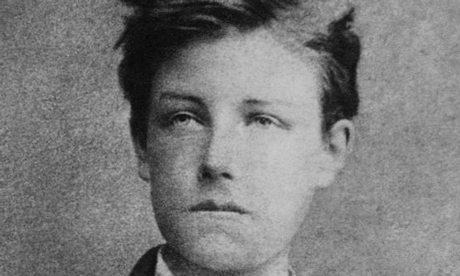 |
| "Je est un autre" ("I is another") — Arthur Rimbaud |
Poetry is often seen as a non-fictional genre, even as an autobiographical genre, and though the perspective we often write from — especially when we use the pronoun "I" — is our own, that doesn't necessarily need to be the case. When reading others' poetry, it's important to remember that the voice isn't necessarily issuing from the poet herself, and conversely, this is a useful reminder that we need not always be bound by our own point of view when writing.
A persona poem is one written from a fictional perspective, not unlike an actor getting into a role. It might take the form of a short vignette (like both of William Blake's poems titled "The Chimney Sweeper") or a longer character study (like Randall Jarrell's "The Woman at the Washington Zoo," or Frank Bidart's epic "Herbert White," a favorite poem of James Franco, who made a short film based on the poem). A persona poem might also be written from the perspective of an animal (like Gregory Corso's "The Mad Yak" or Philip Levine's "Animals Are Passing From Our Lives"), or could be written from a fictional perspective about a real person (or a preexisting character from a novel, film, myth, etc.), implementing a technique that's called "historiographic metafiction" (or "metapoetry," in this case).
You might even go so far as to write a poem from the point of view of an inanimate object (like Richard Brautigan's "The Sawmill" or Howard Moss' "Einstein's Bathrobe"), though in this case you'd still want to suffuse it with as much character, as much voice, emotion, perspective, etc. as you'd give to a fictional character you'd created.
So here are many different options for writing a work that comes from a voice other than your own. For this week's assignment, you might want to just write one poem of any sort, or try both a persona poem and a poem from the perspective of a non-living object, or maybe two persona poems written almost in dialogue with one another (two sides of the same story, perhaps). Regardless of the approach you take, make sure your response is posted by the end of the week.
A persona poem is one written from a fictional perspective, not unlike an actor getting into a role. It might take the form of a short vignette (like both of William Blake's poems titled "The Chimney Sweeper") or a longer character study (like Randall Jarrell's "The Woman at the Washington Zoo," or Frank Bidart's epic "Herbert White," a favorite poem of James Franco, who made a short film based on the poem). A persona poem might also be written from the perspective of an animal (like Gregory Corso's "The Mad Yak" or Philip Levine's "Animals Are Passing From Our Lives"), or could be written from a fictional perspective about a real person (or a preexisting character from a novel, film, myth, etc.), implementing a technique that's called "historiographic metafiction" (or "metapoetry," in this case).
You might even go so far as to write a poem from the point of view of an inanimate object (like Richard Brautigan's "The Sawmill" or Howard Moss' "Einstein's Bathrobe"), though in this case you'd still want to suffuse it with as much character, as much voice, emotion, perspective, etc. as you'd give to a fictional character you'd created.
So here are many different options for writing a work that comes from a voice other than your own. For this week's assignment, you might want to just write one poem of any sort, or try both a persona poem and a poem from the perspective of a non-living object, or maybe two persona poems written almost in dialogue with one another (two sides of the same story, perhaps). Regardless of the approach you take, make sure your response is posted by the end of the week.
No comments:
Post a Comment